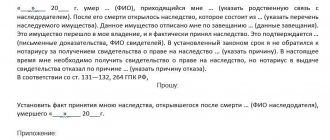About the timing of inheritance
The application must be submitted to a notary or to the court within 6 months from the date of death of the testator (there are exceptions). What does “within 6 months” mean? and what needs to be done? After the death of a citizen, heirs according to the law of the first priority or according to the will have only 6 months to apply for inheritance:
- to court (if there are any inheritance disputes or there are no documents necessary for registration by a notary;
- to a notary (if there are no disputes and the nature of the documents submitted does not contradict the norms of the notary).
To avoid missing the deadline, you can submit documents in person. The second option is to send them by mail or other official delivery service. The date of sending the correspondence will be considered the proper date for filing the application for acceptance of the inheritance.
The Supreme Court preserved the apartment for those who did not register the inheritance on time
The story of one apartment
Margarita Vlasova* owned an apartment in Moscow. She had two daughters - Stasya Churova* and Lyudmila Brykova*, with whom the woman lived together. In 1997, Vlasova died. Brykova remained to live in this apartment with her daughter Olesya Tkacheva*, who had two daughters in subsequent years. In 2015, Tkacheva died, and Brykova and her granddaughters still live in the apartment: she became their guardian.
According to the law, you can accept an inheritance within six months from the date of opening of the inheritance; to do this, you need to contact a local notary. But after Vlasova’s death, none of her daughters went to the notary to inherit the apartment. They turned to a notary only 19 years later - and were refused. Brykov’s many years of delay will later be explained by “legal illiteracy.”
In 2021, Brykova found a way out of the situation. She decided to legalize her residence in the apartment in court and filed a lawsuit against Churova and the Moscow City Property Department. She demanded that the fact of acceptance of the inheritance be established and that her ownership of the apartment be recognized.
The Supreme Court protected the right of heirs to a separate apartment
The department counterclaimed. City officials demanded that the disputed housing be recognized as escheatable property and transferred into state ownership. The lawyer for the City Property Department emphasized that at the time of the death of the testator, Brykova did not have permanent registration in the apartment.
In addition, the woman only sometimes pays utility bills. At the end of 2021, utility debts amounted to more than 350,000 rubles. This means that the “heiress” does not support her properly. In addition, Brykova did not prove that she took at least some action to accept the inheritance in 1997.
Churova asked the court to dismiss her sister’s claim. After all, the two of them were heirs, which means that the apartment should go to both Vlasova’s daughters, and not just Brykova.
The Butyrsky District Court of Moscow agreed with the Department’s arguments. The inheritance had to be accepted on time, and since Brykova did not do this, the apartment should go to the state (case No. 02-1491/2019). This decision was confirmed by the Moscow City and Second Cassation Courts.
Debts and registration do not matter
Brykova appealed to the Supreme Court, and the civil panel considered her complaint (case No. 5-KG21-90-K2).
The Troika, chaired by Andrei Ryzhenkov, turned to the Civil Code of the RSFSR, which was in force at the time of Vlasova’s death. This law, like the modern Civil Code, allowed for the acceptance of an inheritance not only when applying to a notary, but also when actually taking possession of the property. The heir must treat the property “as if it were his own” - manage, use and dispose of it, and maintain it in proper condition. Then we can say that he owns it, which means he accepted the inheritance.
In order to confirm the actual acceptance of the inheritance, you can submit various documents, for example: receipts for payment of taxes, payment of utility bills, contract agreements for repair work and other similar documents.
Moreover, the fact of registration in the apartment at the time of the death of the testator is not at all a circumstance that affects the recognition or non-recognition of his relatives as heirs. The only thing that matters is the fact of actual residence. The debt on utility bills did not matter for the resolution of the dispute, the judges of the Supreme Court are sure. The absence of debt is not one of the conditions for accepting an inheritance, they emphasized.
The lower courts incorrectly considered the dispute, the Supreme Court added, so the case was returned for a new trial at the first instance.
If the heir lived with the testator at the time of his death and after death continued to use the residential premises, if this fact is confirmed, in 99.99% of cases the notary will issue the heir a certificate of inheritance based on its actual acceptance even after the expiration of the six-month period specified by law.
Natalya Kornilevskaya, lawyer at AK Borodin and Partners Borodin and Partners Federal rating. group Bankruptcy (including disputes) (mid market) group Tax consulting and disputes (Tax disputes) group Dispute resolution in courts of general jurisdiction.
Citizens do not make many mistakes when accepting an inheritance, which is confirmed by the small number of similar disputes in the courts, notes the head of the family and inheritance law practice of AB KIAP KIAP Federal Rating. group Arbitration proceedings (medium and small disputes - mid market) group Compliance group Corporate law/Mergers and acquisitions group (mid market) group International arbitration group Dispute resolution in courts of general jurisdiction group Labor and migration law (including disputes) group Antimonopoly law (including disputes ) group Bankruptcy (including disputes) (mid market) group Intellectual Property (Consulting) group Intellectual Property (Registration) group Family and Inheritance Law group TMT (telecommunications, media and technology) group Land Law/Commercial Real Estate/Construction group Intellectual Property (Protection rights and litigation) group Criminal law Company profile Yulia Yanygina. Such cases are quite rare, and the state does not hunt for the apartments of heirs, confirms Natalya Kornilevskaya.
What will help you defend your inheritance in court?
Yanygina advises proving actual acceptance:
- “payments” for housing and communal services;
- documents confirming the costs of current repairs and home improvement.
Kornilevskaya believes that the following will also help:
- testimony from neighbors;
- certificates of cohabitation with the testator;
- certificates from social security authorities and medical institutions about his care.
*Names and surnames have been changed by the editors.
- Maxim Varaksin
- Supreme Court of the Russian Federation
Fractional parts
If the property was purchased by spouses during marriage, the surviving spouse has the right to allocate the marital share. That is, usually 1/2 of the share (if there is no marriage contract) goes to the surviving spouse according to a document issued by a notary. This document is called a “Certificate of Title.” And only after this is the inheritance formed after the deceased spouse - this is the second 1/2 share. It is she who will be inherited by the heirs. In the absence of a will - in equal shares between citizens called to inherit a certain order, in the case of a will - there are options for dividing and allocating obligatory shares under Art. 1148-1149 of the Civil Code. In addition, the will can be contested; this should be taken into account when registering an inheritance.
Division of an apartment between several heirs
Often one single apartment is inherited by several people. It’s good if it’s a spacious three-room apartment for three sons. But what if this is a small studio with several heirs?
It is impossible to live in such a studio apartment, so there are two ways out of the situation:
- The heirs sell the apartment, and the money is divided according to each person’s share.
- One heir buys out the shares of the others and remains to live in the apartment.
Remember that any sale will be possible only after registration of ownership of all heirs.
Registration of inheritance after the death of mother, husband, father, son, wife, parents, grandparents
The Civil Code very cleverly defines kinship and lines of inheritance. It seems that blood relatives, such as grandmother-grandson, granddaughter-grandfather, are not heirs by law. We all understand that these are three generations; children, parents, and grandparents are family members and close relatives. But not everyone can inherit after each other. Natural grandchildren and granddaughters were not registered as heirs after their grandparents. After them, only their own children can inherit, and not grandchildren a generation later.
The only exceptions are cases when the middle generation is not alive, and, instead of the dead, their place is taken by the next generation (grandsons and granddaughters). It’s the same with the third and fourth lines of inheritance.
The first priority of legal heirs is the spouse, children and parents. If there is no one, the second line of heirs is called to inherit, etc. If second cousins or nieces want to inherit after the death of a relative, it is necessary to calculate whether they even fall into the circle of heirs called by law.
Therefore, before writing an application for inheritance to a notary or filing a claim in court, you need to understand who is the heir and who is not. Not every blood relative has the right to inherit after the death of a citizen.
A will written in favor of one of the relatives or third parties can also change the fate of the heirs according to law. The date of writing the will may also change the size of the shares due to the heirs under the will. There are a lot of subtleties. It is difficult for an ordinary citizen not versed in jurisprudence to imagine everything. But to calculate and accurately determine is almost impossible.
Gift or rent
Property can also be transferred under a gift agreement.
According to the law, this is not inheritance; the problem with heirs having an obligatory share is solved accordingly. And challenging a gift agreement is much more difficult than challenging a will. But in this case, risks arise for the testator, since the property is transferred into the ownership of the donee during his lifetime. This method can be used if there is complete trust between the heir and the testator and there are potential heirs with an obligatory share, but the testator, for various reasons, does not want them to receive at least part of his property.
As an option, you can enter into a lifelong maintenance agreement with a dependent. Then the housing also becomes the property of the rent payer, who undertakes to care for and provide for the rent recipient for the rest of his life. This method seems to be the most optimal, since the heirs with a mandatory share will not be able to claim the testator’s property, and the testator will receive the necessary security, otherwise the contract can be terminated in court. But there is a minus: the annuity recipient has an obligation to pay tax on the funds received.
Registration of inheritance after death
After the death of a citizen, the procedure for processing documents can be simple or complex.
An example of a simple inheritance registration.
Mother died.
Her only heir is her daughter. The apartment is privatized, the documents are in order. The apartment is located in the same city where the daughter lives. My daughter didn’t change her last name, her passport is fine. After the funeral, 2 months later, the daughter collected the necessary additional certificates and began registering the inheritance with a notary. In this example, of course, the daughter can handle the inheritance process herself after the death of her mother. This is not a difficult matter. It is only important that you have time to collect documents and be present in government organizations.
An example of complex inheritance registration.
Mother died. She was married four times. The documents have not been preserved. The apartment in which the mother lived before her death has begun to be privatized and the paperwork has not been completed. The ex-husband claims a share of the inheritance. In addition, the mother had a disabled nephew, whom she supported with her own money and took care of him in every possible way. In addition, during her life, her mother often recalled the unregistered farm in the Novgorod region after her grandmother. And one more thing - the bank filed for a refund of the loan funds.
This is a difficult matter. Not every specialist will be able to understand it. If all the heirs who are entitled to shares in the inheritance can come to an amicable agreement, good. What if everyone “pulls the blanket in their own direction”?
It is important for lawyers to work in the interests of their client. If the customer is a daughter, then the maximum share of the inheritance should go to her. If the customer is a disabled nephew, then the lawyer’s actions are strictly opposite to what a lawyer would do to protect his daughter’s rights. What if your daughter was doing expensive renovations in her apartment? What if the loan was taken out in order to use it for an operation for his mother, and his disabled nephew was supported by his mother’s money, which was given to her by the same daughter? There are many legal positions here that will be different under different circumstances of the case. And citizens themselves are not able to understand such inheritance matters or such complex situations.
Registration procedure
You can register ownership of an apartment:
- In any territorial branch of the registration chamber. In 2021, this opportunity is limited. Most branches direct visitors to the MFC.
- Through the Rosreestr website. To do this, you must have an authorized personal account on the State Services website. But here you can only submit an application and attach documents. To get the result, you will have to personally contact the Rosreestr branch, which you will choose yourself through the website. When submitting your application, you must scan the required documents. If you apply in person, you will need to present the originals.
- Through MFC. The law does not provide for contacting a specific center. You can independently choose the center that suits you.
The interested party independently decides where it is more convenient for him to draw up documents. However, if the applicant applies to the MFC, then the documents from there are subsequently sent to Rosreestr. The procedure will take 2 – 3 days longer.
Expenses
The heir pays a fee for registration of ownership rights.
The amount of state duty is determined by Tax legislation:
- For registration of an apartment, each heir must pay 2000 rubles. (Article 333.33 of the Tax Code of the Russian Federation);
- for registering a share of common property in an apartment building, you must pay another 200 rubles.
If the paperwork is completed through a representative, the heir will additionally need to pay:
- The cost of his services. There is no fixed rate here. The parties independently determine the amount of the representative's remuneration.
- Notarized power of attorney. Its cost depends on the region of registration. On average, in 2021 you will need to pay 2000 rubles.
Deadlines
Registration of ownership of real estate is carried out by an authorized state body within 7 - 14 days . It all depends on where exactly the applicant submitted the documents.
After receiving the necessary papers, the applicant becomes the full owner of the inherited apartment.
Registration through MFC
Re-registration of documents from the testator to the heir occurs after receipt of the certificate. You can submit papers to Rosreestr through the MFC.
The government body was created to simplify the procedure for registering property rights. The MFC collects documents and applications from citizens and distributes them among authorized organizations. Thus, copyright holders do not need to go to different organizations.
You can make an appointment:
- directly to the MFC;
- through State Services;
- on the My Documents website.
Registration of property rights through the MFC usually takes 7 - 14 working days . The increase in deadlines occurs due to the need to transfer documents to Rosreestr and back.
Payment of state duty can be made:
- through terminals at the MFC;
- through a bank branch;
- through the State Services website;
- through the Rosreestr website;
- via online banking.
The primary document for registering property rights is an application. The document has a unified form. Each field is filled in according to its purpose.
Required details:
- applicant's passport details;
- residential address;
- marital status, citizenship;
- Date of Birth;
- the basis for the appeal;
- application for registration of rights;
- property regime;
- apartment area;
- presence of encumbrances;
- cadastral number;
- location of the property;
- date, signature.
The application is filled out by the MFC operator. The heir must read the document and sign.
When submitting an application, the MFC employee must issue a receipt confirming receipt of the package of documents. On its basis, the applicant will be able to receive an extract from the Unified State Register of Real Estate.
The date of issue of documents is usually indicated on the receipt. In case of suspension of registration of a right, the interested person will receive a notification by email or telephone.
The SMS will indicate the reason for the suspension and the time frame for its elimination. One of the reasons may be the lack of evidence of payment of the state duty.
It is advisable to visit a branch of Rosreestr or the MFC and provide proof of payment of the fee. If the heir does not respond within the allotted time, he will be denied registration of property rights.
Registration of inheritance if there is nothing to inherit
In some cases, unregistered objects can be inherited
An unregistered dacha, unprivatized apartments, unknown property, etc. are reasons to contact a legal organization to prove the real inheritance. Of course, it is not possible to register property in all cases. But, if, after careful work, evidence is found that proves the citizen’s intention to register real estate as a property during his lifetime, one can hope for the success of the case.
Is it necessary to register ownership of an apartment by inheritance?
After all the documents are completed by the notary, the relatives of the deceased citizen are issued an inheritance certificate. This is a document of title that confirms the rights of citizens to inherited property. On its basis, property rights are registered.
Expert opinion
Stanislav Evseev
Lawyer. Experience 12 years. Specialization: civil, family, inheritance law.
The procedure confirms the change of owner of the property and gives the heir the right to dispose of the property at his own discretion. For example, sell or donate a home to a family member.
Without state registration of property rights, heirs will not be able to dispose of the property in full. Regardless of having access to or living in an apartment.
Suspension of the right registration procedure
Sometimes, when submitting documents to the registrar, unpleasant moments arise that lead to the suspension of the procedure (Article 26 of the Federal Law of July 13, 2015 No. 218-FZ).
Reasons:
- The registration documents are submitted by an inappropriate person.
- Contradictions between the declared and previously registered rights were revealed.
- The applicant did not provide all documents.
- Inaccurate information was found in the papers.
- Legal proceedings have been opened against the property, and a ban on registration actions has been imposed.
- There is a court decision declaring the inheritance certificate invalid.






